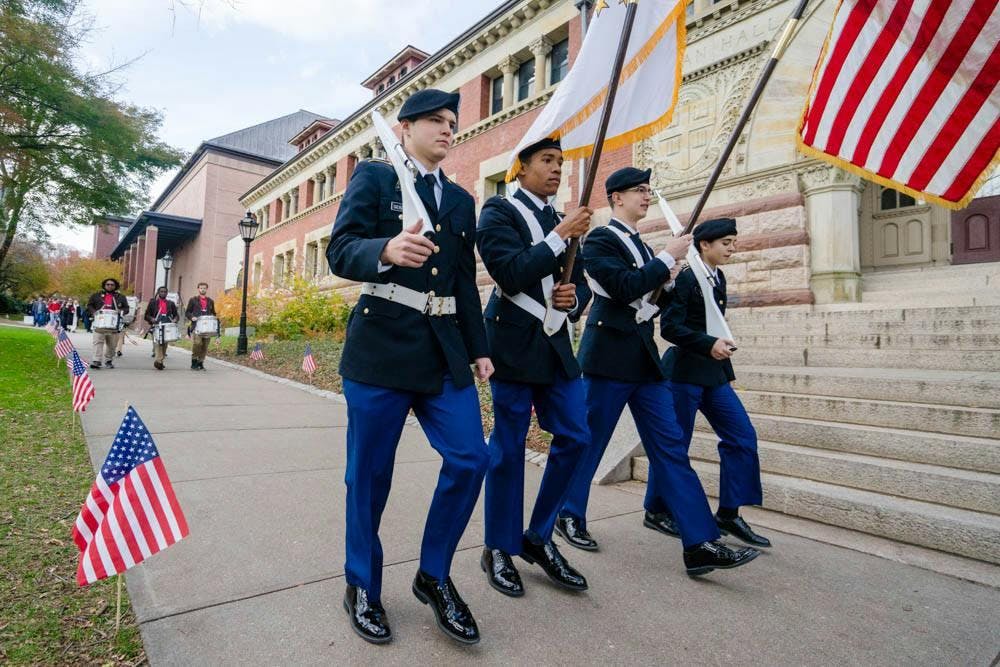Four years after committing to double the enrollment of undergraduate student veterans by 2024, the University has surpassed its goal and secured permanent funding for full veteran scholarships, according to an Oct. 17 press release.
22 student veterans enrolled at the University in September, bringing the University's total undergraduate veteran population to 49, according to the press release. When the University set its goal in 2019, the total number of veterans on campus was 21, The Herald previously reported.
“The types of veterans that served in the military and then want to pursue Brown are really rich in terms of what they can add to the community,” said Christian “Mac” Manning, program director for the Office of Military-Affiliated Students. “They have really diverse backgrounds, they have diverse experiences.”
“We are immensely grateful for the support of Brown student veterans, OMAS, Brown alumni and friends who have made this initiative so successful,” Logan Powell, associate provost for enrollment and dean of undergraduate admission, wrote in an email to The Herald. “Student veterans bring an invaluable perspective to College Hill and their service and sacrifice make Brown a stronger community.”
The doubled student veteran enrollment follows the rollout of a broad set of initiatives aimed at making Brown more accessible and welcoming for student veterans, according to the press release. President Christina Paxon P’19 P’MD’20 previously announced the University’s plans to eliminate out-of-pocket costs, make applications need-blind and eliminate standardized testing requirements for prospective undergraduate veterans.
A $20 million gift from Joseph P. Healey P’22 P’24 in 2020 was a key contributor to building out an endowment of scholarships for students who had previously served in the military, according to the press release. Coupled with the completion of a $25 million fundraising campaign, the donation allows the University to offer student veterans full scholarships in future application cycles, according to the press release.
“Turning Brown into an affordable choice and a supportive educational environment for a broader segment of our nation’s extraordinary, courageous veterans not only honors their service, but also enhances the education of all Brown students who benefit from veterans’ perspectives and experiences,” Paxson said in the press release.
Veterans can receive up to $27,120 annually from the Post-9/11 GI Bill to go towards mandatory tuition and fees. At Brown, the difference is made up through Yellow Ribbon awards, which are contributions from private institutions towards the tuition of veterans, and matched funding from the U.S. Department of Veterans Affairs, according to the press release.
Consequently, there are no out-of-pocket costs for veterans at Brown, Manning said.
“That makes us enormously competitive,” he said. “Brown is an institution that's really committed to working with specialized populations and trying to cut through financial barriers and they’ve done a good job with that.”
When Sean Braga ’25, who served in the army for four years and is the president of the Student Veteran Society at Brown, was applying to college, he encountered some institutions that were unable to provide him adequate Yellow Ribbon benefits. Brown, he said, was able to guarantee that he would not have to pay any out-of-pocket educational expenses.
Beyond the recent growth in financial support for student veterans, Manning said that he attributes the University’s success in meeting its enrollment goal to the Veterans Application, a separate, rolling application that first opened to prospective students in the 2021-22 application cycle.
The specialized application encouraged prospective students to submit recommendations from military commanding officers and allows “maximum time flexibility” for currently serving veterans, who are often deployed on missions without consistent access to a computer, according to Powell.
Jonathan Black ’25 served in the Marines for five years before applying to Brown as a transfer student from the University of North Carolina at Charlotte during the 2020-21 application cycle.
Without the Veterans Application, it was “really tough to navigate the application system,” Black said. “I had been out of high school for five years and the application was asking me for teacher recommendations, counselor recommendations and all this stuff.”
Targeted recruitment efforts have also been an “integral and indispensable” part of the University’s efforts to double the population of student veterans, according to Powell.
“We have partnered with organizations such as Service to School to identify and communicate with talented student veterans from across the country, we have hosted more virtual outreach sessions and we have attended more in-person events as well,” he wrote in an email to The Herald.
Both Black and Braga engaged with Service to School during the admissions process. Black worked with a counselor who helped him integrate his military experience into his application, he said.
Braga has also worked with Warrior Scholars, an organization partnered with the University, and was able to obtain an alternative letter of recommendation for his application through the program.
“Brown's done a really great job,” Barga said. “More and more service members are learning that schools like Brown are an option for them and that schools like Brown value the perspective that they're able to bring to their student bodies.”
Ethan Schenker is a university news editor covering staff and student labor. He is from Bethesda, MD, and plans to study International and Public Affairs and Economics. In his free time, he enjoys playing piano and clicking on New York Times notifications.





